北师大版(2019)必修 第三册Unit 8 Green living易混易错点辨析学案(含答案)
文档属性
| 名称 | 北师大版(2019)必修 第三册Unit 8 Green living易混易错点辨析学案(含答案) | 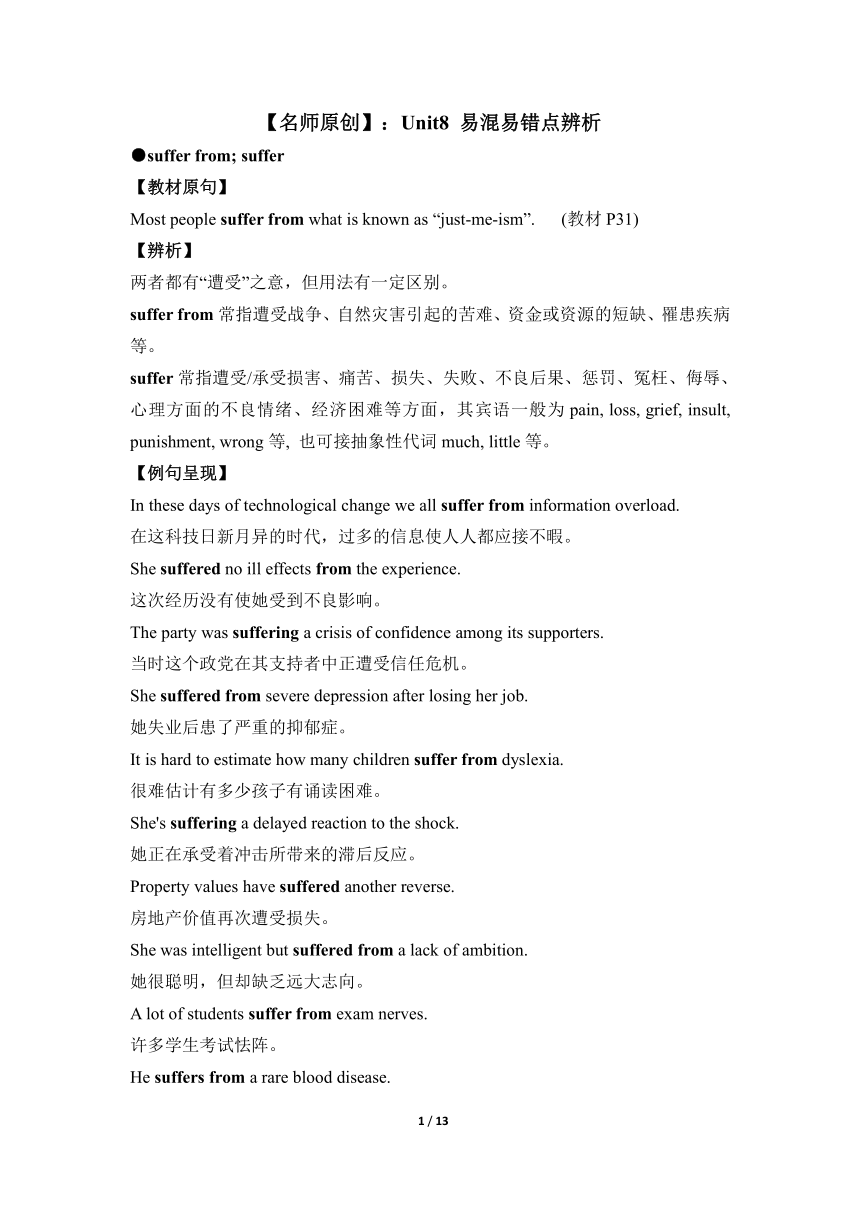 | |
| 格式 | doc | ||
| 文件大小 | 94.5KB | ||
| 资源类型 | 教案 | ||
| 版本资源 | 北师大版(2019) | ||
| 科目 | 英语 | ||
| 更新时间 | 2023-03-07 21:45:51 | ||
图片预览

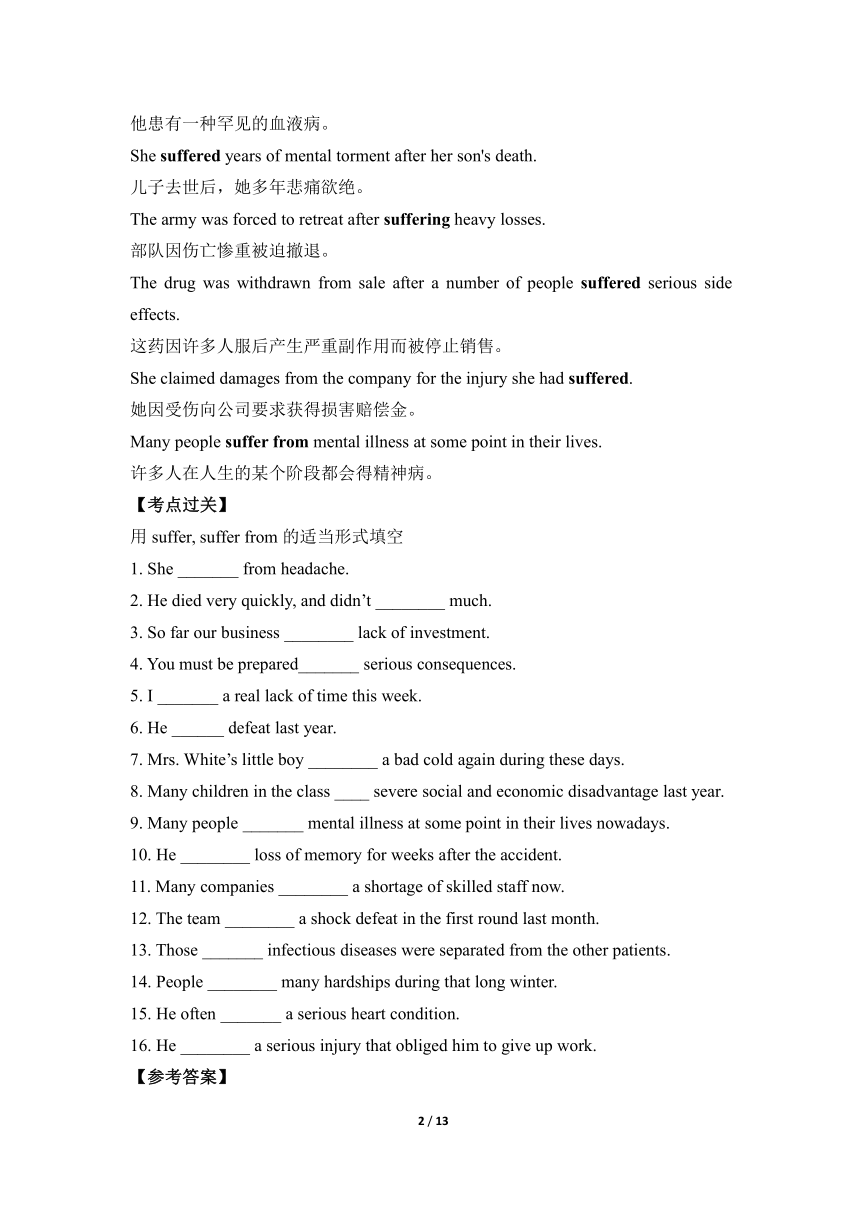
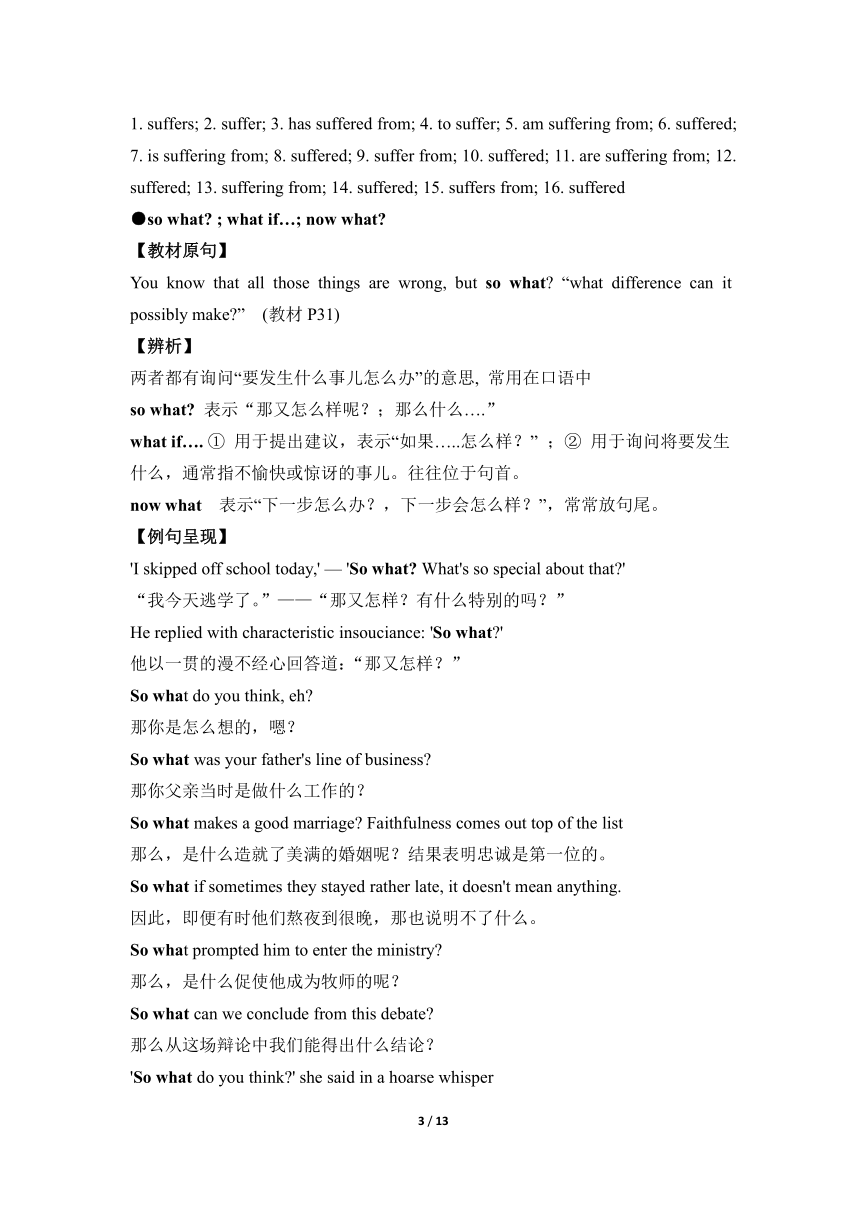
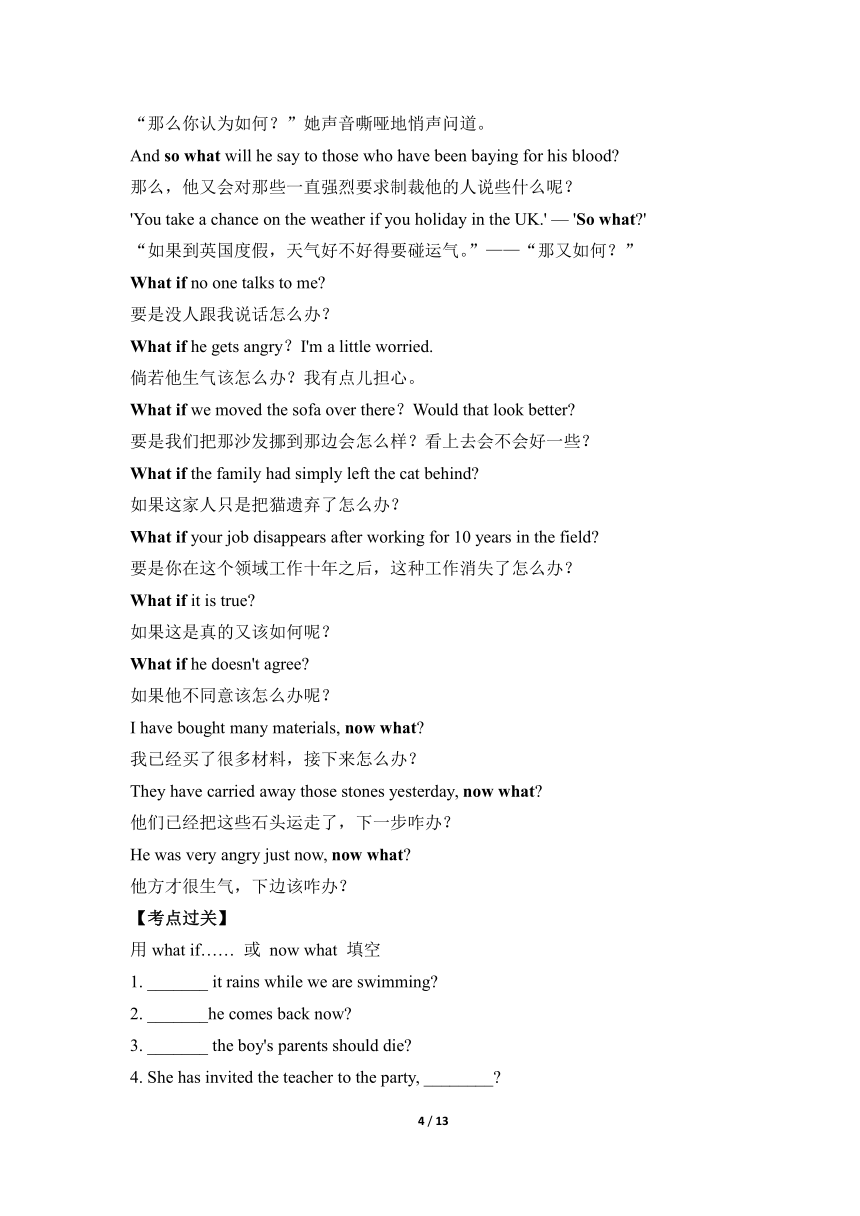
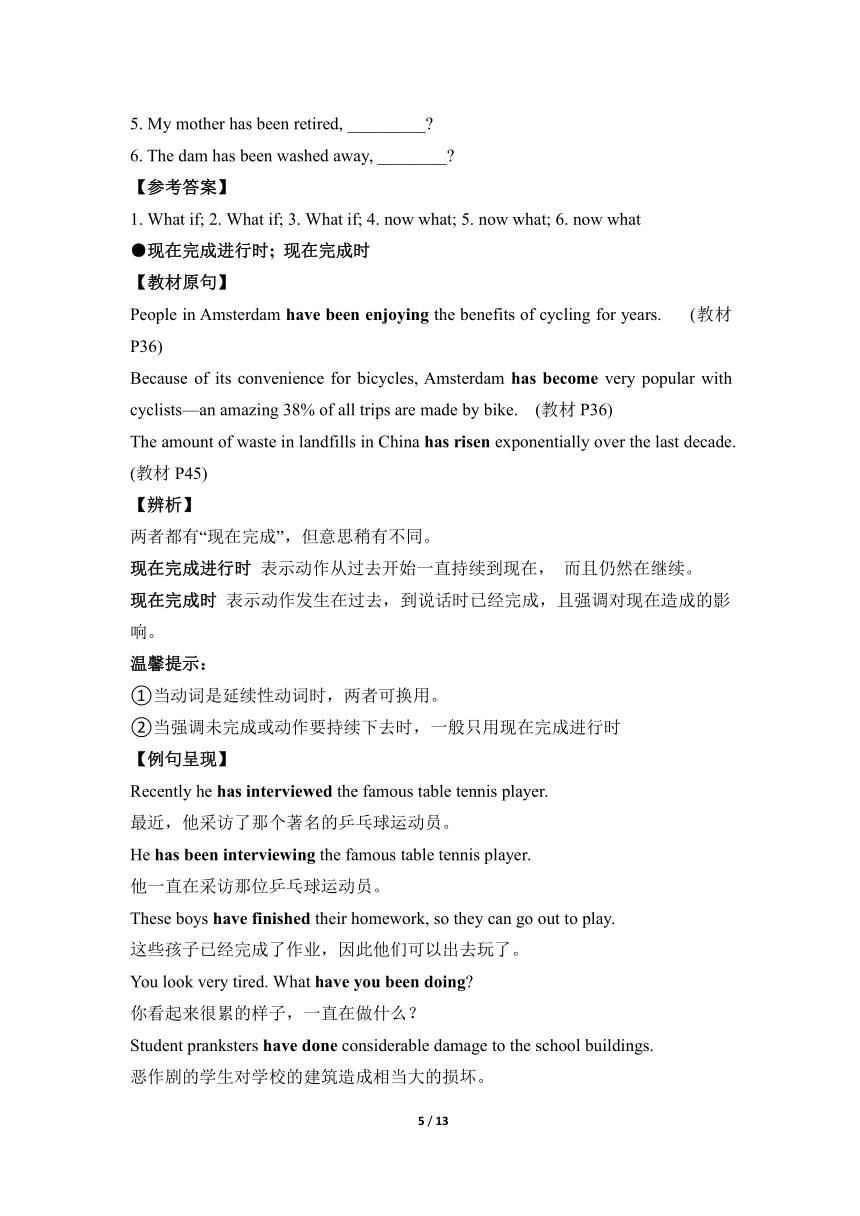
文档简介
【名师原创】:Unit8 易混易错点辨析
●suffer from; suffer
【教材原句】
Most people suffer from what is known as “just-me-ism”. (教材P31)
【辨析】
两者都有“遭受”之意,但用法有一定区别。
suffer from常指遭受战争、自然灾害引起的苦难、资金或资源的短缺、罹患疾病等。
suffer常指遭受/承受损害、痛苦、损失、失败、不良后果、惩罚、冤枉、侮辱、心理方面的不良情绪、经济困难等方面,其宾语一般为pain, loss, grief, insult, punishment, wrong等, 也可接抽象性代词much, little等。
【例句呈现】
In these days of technological change we all suffer from information overload.
在这科技日新月异的时代,过多的信息使人人都应接不暇。
She suffered no ill effects from the experience.
这次经历没有使她受到不良影响。
The party was suffering a crisis of confidence among its supporters.
当时这个政党在其支持者中正遭受信任危机。
She suffered from severe depression after losing her job.
她失业后患了严重的抑郁症。
It is hard to estimate how many children suffer from dyslexia.
很难估计有多少孩子有诵读困难。
She's suffering a delayed reaction to the shock.
她正在承受着冲击所带来的滞后反应。
Property values have suffered another reverse.
房地产价值再次遭受损失。
She was intelligent but suffered from a lack of ambition.
她很聪明,但却缺乏远大志向。
A lot of students suffer from exam nerves.
许多学生考试怯阵。
He suffers from a rare blood disease.
他患有一种罕见的血液病。
She suffered years of mental torment after her son's death.
儿子去世后,她多年悲痛欲绝。
The army was forced to retreat after suffering heavy losses.
部队因伤亡惨重被迫撤退。
The drug was withdrawn from sale after a number of people suffered serious side effects.
这药因许多人服后产生严重副作用而被停止销售。
She claimed damages from the company for the injury she had suffered.
她因受伤向公司要求获得损害赔偿金。
Many people suffer from mental illness at some point in their lives.
许多人在人生的某个阶段都会得精神病。
【考点过关】
用suffer, suffer from的适当形式填空
1. She _______ from headache.
2. He died very quickly, and didn’t ________ much.
3. So far our business ________ lack of investment.
4. You must be prepared_______ serious consequences.
5. I _______ a real lack of time this week.
6. He ______ defeat last year.
7. Mrs. White’s little boy ________ a bad cold again during these days.
8. Many children in the class ____ severe social and economic disadvantage last year.
9. Many people _______ mental illness at some point in their lives nowadays.
10. He ________ loss of memory for weeks after the accident.
11. Many companies ________ a shortage of skilled staff now.
12. The team ________ a shock defeat in the first round last month.
13. Those _______ infectious diseases were separated from the other patients.
14. People ________ many hardships during that long winter.
15. He often _______ a serious heart condition.
16. He ________ a serious injury that obliged him to give up work.
【参考答案】
1. suffers; 2. suffer; 3. has suffered from; 4. to suffer; 5. am suffering from; 6. suffered; 7. is suffering from; 8. suffered; 9. suffer from; 10. suffered; 11. are suffering from; 12. suffered; 13. suffering from; 14. suffered; 15. suffers from; 16. suffered
●so what ; what if…; now what
【教材原句】
You know that all those things are wrong, but so what “what difference can it possibly make ” (教材P31)
【辨析】
两者都有询问“要发生什么事儿怎么办”的意思, 常用在口语中
so what 表示“那又怎么样呢?;那么什么….”
what if…. ① 用于提出建议,表示“如果…..怎么样?” ;② 用于询问将要发生什么,通常指不愉快或惊讶的事儿。往往位于句首。
now what 表示“下一步怎么办?,下一步会怎么样?”,常常放句尾。
【例句呈现】
'I skipped off school today,' — 'So what What's so special about that '
“我今天逃学了。”——“那又怎样?有什么特别的吗?”
He replied with characteristic insouciance: 'So what '
他以一贯的漫不经心回答道:“那又怎样?”
So what do you think, eh
那你是怎么想的,嗯?
So what was your father's line of business
那你父亲当时是做什么工作的?
So what makes a good marriage Faithfulness comes out top of the list
那么,是什么造就了美满的婚姻呢?结果表明忠诚是第一位的。
So what if sometimes they stayed rather late, it doesn't mean anything.
因此,即便有时他们熬夜到很晚,那也说明不了什么。
So what prompted him to enter the ministry
那么,是什么促使他成为牧师的呢?
So what can we conclude from this debate
那么从这场辩论中我们能得出什么结论?
'So what do you think ' she said in a hoarse whisper
“那么你认为如何?”她声音嘶哑地悄声问道。
And so what will he say to those who have been baying for his blood
那么,他又会对那些一直强烈要求制裁他的人说些什么呢?
'You take a chance on the weather if you holiday in the UK.' — 'So what '
“如果到英国度假,天气好不好得要碰运气。”——“那又如何?”
What if no one talks to me
要是没人跟我说话怎么办?
What if he gets angry?I'm a little worried.
倘若他生气该怎么办?我有点儿担心。
What if we moved the sofa over there?Would that look better
要是我们把那沙发挪到那边会怎么样?看上去会不会好一些?
What if the family had simply left the cat behind
如果这家人只是把猫遗弃了怎么办?
What if your job disappears after working for 10 years in the field
要是你在这个领域工作十年之后,这种工作消失了怎么办?
What if it is true
如果这是真的又该如何呢?
What if he doesn't agree
如果他不同意该怎么办呢?
I have bought many materials, now what
我已经买了很多材料,接下来怎么办?
They have carried away those stones yesterday, now what
他们已经把这些石头运走了,下一步咋办?
He was very angry just now, now what
他方才很生气,下边该咋办?
【考点过关】
用what if…… 或 now what 填空
1. _______ it rains while we are swimming
2. _______he comes back now
3. _______ the boy's parents should die
4. She has invited the teacher to the party, ________
5. My mother has been retired, _________
6. The dam has been washed away, ________
【参考答案】
1. What if; 2. What if; 3. What if; 4. now what; 5. now what; 6. now what
●现在完成进行时; 现在完成时
【教材原句】
People in Amsterdam have been enjoying the benefits of cycling for years. (教材P36)
Because of its convenience for bicycles, Amsterdam has become very popular with cyclists—an amazing 38% of all trips are made by bike. (教材P36)
The amount of waste in landfills in China has risen exponentially over the last decade. (教材P45)
【辨析】
两者都有“现在完成”,但意思稍有不同。
现在完成进行时 表示动作从过去开始一直持续到现在, 而且仍然在继续。
现在完成时 表示动作发生在过去,到说话时已经完成,且强调对现在造成的影响。
温馨提示:
①当动词是延续性动词时,两者可换用。
②当强调未完成或动作要持续下去时,一般只用现在完成进行时
【例句呈现】
Recently he has interviewed the famous table tennis player.
最近,他采访了那个著名的乒乓球运动员。
He has been interviewing the famous table tennis player.
他一直在采访那位乒乓球运动员。
These boys have finished their homework, so they can go out to play.
这些孩子已经完成了作业,因此他们可以出去玩了。
You look very tired. What have you been doing
你看起来很累的样子,一直在做什么?
Student pranksters have done considerable damage to the school buildings.
恶作剧的学生对学校的建筑造成相当大的损坏。
This man has done nothing wrong.
这位男子没有做过不正当的事。
She has done more to divide the Conservatives than anyone else
她在分裂保守党这件事上所起的作用比任何人都大。
Biological systems have been doing this for billions of years
生物系统亿万年来一直都是这样。
Some scientists have been doing research on artificial internal organs.
一些科学家一直在研究人造内脏。
We will continue to do what we have been doing. Nothing changes."
我们会继续做我们一直在做的。没有什么会发生变化。”
What she has done/has been doing is perfectly legal.
她的所作所为是完全合法的。
I have done/have been doing woodwork for many years.
我做木工好多年了。
【考点过关】
用现在完成时或现在完成进行时填空
1. So far do you know what those naughty boys _______ (do)
2. I __________ (work) here since I moved here in 1999.
3. This research ______ (do) much to advance our understanding of language learning.
4. She’s _____________ (live) here ever since she was ten.
5. She _______ (do) her best to keep calm but finds herself trembling with tension.
6. Those who _______ (do) evil should immediately stop, repent and start anew and make amends for their crimes by good deeds.
7. So far I _________ (make) quite a few friends here.
8. Some American scientists ________ (do) well in developing markets for many years.
9. The old man ________ (repair) cars for thirty years.
10. He _______ (do) this sort of work for years and will continue.
11. And driving on Mars is exactly what planetary scientist Steve Square _______ (do) since 2004 and it will never stop.
12. Jack ________ (practice) Tai Chi for more than a year.
【参考答案】
1. have done; 2. have worked/have been working; 3. has done/has been doing; 4. has lived/has been living; 5. has done; 6. have been doing; 7. have made; 8. have been doing/have done; 9. has been repairing/has repaired; 10. has been doing; 11. has been doing; 12. has been practicing/has practiced
●contribute; donate
【教材原句】
Other human activities, such as construction and the burning of waste, also contribute to air pollution. (教材P44)
You can easily contribute to reducing air pollution by only using a car to make journeys when it’s absolutely necessary. (教材P44)
【辨析】
donate意思是“捐献、捐赠”,用义相对较窄,表示捐赠钱物时可以和contribute 互换,但是,如果表示捐献人的血液或器官时,只能用donate, 不能用contribute,donate的名词donation,常构成donate sth. to….结构。
contribute普通用词,用义范围广,除了“捐献,捐赠”意思之外,还可表示“贡献,捐献,促进,增加,对….起作用”等意思, contribute的名词为contribution.
常构成以下结构:contribute sth. to….,表示“把…..捐给….;向….投稿”; contribute to….;表示“对…..做出贡献;对…..起作用;导致”等。
【例句呈现】
It was generous of her to donate/contribute such a large sum to the relief fund.
她很慷慨,捐了一大笔钱给救济基金会。
There are many warm-hearted people in our society who voluntarily to donate
/contribute money to help the disabled.
社会上有许多热心人自愿捐款帮助残疾人。
You can't expect a miser like her to donate/contribute money.
你就别指望像他那样的小气鬼能捐钱了。
Many rich people in the United States donated/contributed big sums of money to universities and colleges.
美国许多富豪给大学捐赠巨款。
They successfully held a concert and donated/contribute the proceeds to charity.
他们成功举办了一次音乐会,把收入捐给了慈善机构。
Many people show much concern for children's welfare institution, and contribute /donate money and materials to help the institutions improve their conditions.
很多人关心儿童福利院,向儿童福利院捐款捐物帮助改善条件。
It is stipulated that young people should have the duty to donate blood on unpaid basis.
据规定年轻人有义务无偿献血。
In his will he volunteered to donate his body to medical research.
在他的遗嘱里, 他自愿捐献遗体给医学研究
【考点过关】
根据donate, contribute 的用法用其适当形式填空
1. He ________ important cultural relics of his own collection to the state last year.
2. He ________ large sums of money to charity every year.
3. It is mandatory for blood banks to test all _______ blood for the virus.
4. _______ time and energy to others can take you out of yourself.
5. The government calls on the youth to _______ their blood voluntarily.
6. The local people lined up to _______ money to the earthquake-hit area.
7. As the patient's life hung in the balance, many comrades offered to _______ blood.
8. I believe that each of us can ________ to the future of the world
9. I was asked to _______ to a newspaper article making predictions for the new year.
10. So far the government's policies _________ to the volatility of the region.
11. I am sure that this meeting will _______ to the reinforcement of peace and security all over the world
12. The chaos may have _______ to the deaths of up to 20 people.
【参考答案】
1. donated/contributed; 2. donates/contributes; 3. donated; 4. Donating/Contributing;
5. donate; 6. donate/contribute; 7. donate; 8. contribute; 9. contribute; 10. contribute;
11. contribute; 12. contributed
●supply; provide; offer
【教材原句】
When this happens, the chances of dangerous chemicals in the waste entering our water supply increase. (教材P45)
【辨析】
三者都可表示 “供给、提供”,但用法表达有一定区别。
supply表示“供应;补充;弥补”,一般强调替换或补足所需之物以及弥补缺陷,满足要求,常用于supply sb. with sth.= supply sth. to sb.结构。还可作名词,意为“供给(量);物资;存货”,常用复数形式。
provide表示“供给,提供,装备;准备”,常强调有预见,通过储存等方式为应对意外、紧急情况等做准备,以便需要时提供所需物品。常用于provide sb. with sth. = provide sth. for/to sb.结构。有时supply 和 provide 可以互换。
offer 表示“提出,提供;呈现”,着重强调主动向别人提供物品、帮助和服务等。常用于offer to do sth..;offer sb. sth.= offer sth. to/for sb./sth. 句型。
【例句呈现】
Supplies of food are almost exhausted.
贮存的食物快吃完了。
We cannot guarantee adequate supplies of raw materials.
我们不能保证提供充足的原料。
A transport plane carrying food and medical supplies for refugees has arrived.
一架为难民运送食物和医疗用品的运输机已经到了。
Their aim was to block guerrilla supply lines.
他们的目的是封锁游击队的供给线。
They are at the end of their food supply.
他们的食物储备已消耗殆尽。
We are here to provide a service for the public.
我们来这里是为公众服务。
The company has won a contract to supply books and materials to schools.
这家公司得到了一份向学校供应图书资料的合同。
Water supplies to the house are at low pressure.
这房子的供水压很低。
The hospital has a commitment to provide the best possible medical care.
这家医院承诺要提供最好的医疗服务。
The network will provide computer services to your home.
这个网络将为家庭提供全方位的计算机服务。
A firewall provides an essential security blanket for your computer network.
防火墙为计算机网络提供了基本安全保障。
The school provided food for the students.
学校为学生提供伙食。
They provided us with all the books we need.
他们为我们提供所需要的所有书籍。
The bank provided/supplied him with a loan $100,000.
银行为他提供了10万美元的贷款。
She offered me a cup of tea.
她给我端了杯茶。
He offered to go instead of me.
他主动提出代替我去。
Several people were passing but nobody offered to help.
有几个人擦肩而过,却没有人主动提出帮助。
She offered us five different kinds of cake.
她给我们提供了五种不同的蛋糕。
【考点过关】
根据supply, provide和offer的用法填空并注意括号内词的形式
1. Our _______ (supply) were running out.
2. Teachers provide a model ______ children to imitate.
3. The charity aims ________ (provide) assistance to people in need.
4. The cars will _______ (supply) to people all over the country.
5. Cows supply us _______ milk.
6. In Britain milk is supplied ______ each house in bottles.
7. We _______ (offer, provide) customers a free home delivery service.
8. The statistics offer further support _______ our theory.
9. We _______ (offer , supply, provide) a personal service to all our customers.
10. His company offers a flexible packaging service _______ the food industry.
【参考答案】
1. supplies; 2. for/to; 3. provide; 4. supplied; 5. with; 6. to; 7. offer; 8. to/for; 9. offer/supply/provide; 10. for/to
●amount; quantity
【教材原句】
The amount of waste in landfills in China has risen exponentially over the last decade. (教材P45)
【辨析】
两者都可以表示数量,但用法有区别。
amount 意思是“数量;数额;总数”,做动词是“达到,相当,等同”的意思, 常构成以下短语:
①a huge/large amount of…./large amounts of….大量,许多,后面一般接不可数名词,作主语时,谓语动词根据amount来确定,如果amount 是单数,谓语动词就用单数;如果amount是复数,谓语动词就用复数。
②amount to….达到;合计为;相当于,等于
quantity 意思是“数量; 大量”,常构成以下短语:
①a large quantity of…./large quantities of ……大量,后面既可以跟可数名词,也可以跟不可数名词,作主语时,谓语动词根据quantity 的单复数来确定,如果quantity 是单数,谓语动词就用单数;如果quantity是复数,谓语动词就用复数。
②in quantity = in large quantities 大量地
【例句呈现】
The police found a quantity of drugs at his home.
警察在他家发现了大量毒品。
It is usually economical to buy washing powder in large quantities.
大量购买洗衣粉通常要省钱些。
A large quantity of drugs was seized during the raid.
在这次突击行动中起获了大量毒品。
A swoop by customs officers netted a large quantity of drugs.
海关人员突然袭击,缉获大量毒品。
The Customs have seized large quantities of smuggled heroin.
海关查获了大量走私的海洛因。
It's just very time consuming to get such a large quantity of data.
获取如此大量的数据非常费时。
Modern computers can organize large amounts of data very quickly.
现代计算机能迅速处理大量的信息资料。
There is still an immense amount of work to be done.
还有非常非常多的工作没有做。
Somewhere along the line a large amount of money went missing.
有一笔巨款在某一环节上不翼而飞。
Teachers have a limited amount of time to interact with each child.
教师和每个孩子沟通的时间有限。
The tank had leaked a small amount of water.
水箱渗漏出少量的水。
The total collection last week amounted to 250.
上周的募捐总额达250英镑。
【考点过关】
根据quantity和amount的用法填空。
1. A large quantity of air conditions ________ (sell) since the summer came.
2. It's a pity that large quantities of wood ______ (waste) that way all over the world.
3. There _______ (be) a large quantity of rain in this area.
4. When you are travelling, don’t display large _______ of cash to others.
5. A large quantity of crops _________ (destroy) by the hurricane last week.
6. Large quantities of milk _______ (send) to the children in poor area the day before yesterday.
7. Large amounts of money _______ (spent) on building the bridge last year.
8. They buy cotton _______ quantity.
9. There _______ (be) only a small amount of food.
10. The villagers planted different kinds of trees _______ large quantities on the hill last year.
11. My income for that week amounted ________ &112.
12. As a result of destroying the forests, a large quantity of desert _______ (cover) the land so far.
13. Keeping what belongs to another ______ (amount) to stealing.
14. With many forests being destroyed, huge quantities of good earth ______ (wash) away each year.
15. Huge quantities of oil ________ (ship) to Japan last year.
【参考答案】
1. have been sold 2. have been wasted; 3. is; 4. amounts/quantities; 5. was destroyed; 6. were sent; 7. were spent; 8. in; 9. is; 10. in; 11. to; 12. has covered; 13. amounts; 14. are being washed; 15. were shipped
PAGE
2 / 2
●suffer from; suffer
【教材原句】
Most people suffer from what is known as “just-me-ism”. (教材P31)
【辨析】
两者都有“遭受”之意,但用法有一定区别。
suffer from常指遭受战争、自然灾害引起的苦难、资金或资源的短缺、罹患疾病等。
suffer常指遭受/承受损害、痛苦、损失、失败、不良后果、惩罚、冤枉、侮辱、心理方面的不良情绪、经济困难等方面,其宾语一般为pain, loss, grief, insult, punishment, wrong等, 也可接抽象性代词much, little等。
【例句呈现】
In these days of technological change we all suffer from information overload.
在这科技日新月异的时代,过多的信息使人人都应接不暇。
She suffered no ill effects from the experience.
这次经历没有使她受到不良影响。
The party was suffering a crisis of confidence among its supporters.
当时这个政党在其支持者中正遭受信任危机。
She suffered from severe depression after losing her job.
她失业后患了严重的抑郁症。
It is hard to estimate how many children suffer from dyslexia.
很难估计有多少孩子有诵读困难。
She's suffering a delayed reaction to the shock.
她正在承受着冲击所带来的滞后反应。
Property values have suffered another reverse.
房地产价值再次遭受损失。
She was intelligent but suffered from a lack of ambition.
她很聪明,但却缺乏远大志向。
A lot of students suffer from exam nerves.
许多学生考试怯阵。
He suffers from a rare blood disease.
他患有一种罕见的血液病。
She suffered years of mental torment after her son's death.
儿子去世后,她多年悲痛欲绝。
The army was forced to retreat after suffering heavy losses.
部队因伤亡惨重被迫撤退。
The drug was withdrawn from sale after a number of people suffered serious side effects.
这药因许多人服后产生严重副作用而被停止销售。
She claimed damages from the company for the injury she had suffered.
她因受伤向公司要求获得损害赔偿金。
Many people suffer from mental illness at some point in their lives.
许多人在人生的某个阶段都会得精神病。
【考点过关】
用suffer, suffer from的适当形式填空
1. She _______ from headache.
2. He died very quickly, and didn’t ________ much.
3. So far our business ________ lack of investment.
4. You must be prepared_______ serious consequences.
5. I _______ a real lack of time this week.
6. He ______ defeat last year.
7. Mrs. White’s little boy ________ a bad cold again during these days.
8. Many children in the class ____ severe social and economic disadvantage last year.
9. Many people _______ mental illness at some point in their lives nowadays.
10. He ________ loss of memory for weeks after the accident.
11. Many companies ________ a shortage of skilled staff now.
12. The team ________ a shock defeat in the first round last month.
13. Those _______ infectious diseases were separated from the other patients.
14. People ________ many hardships during that long winter.
15. He often _______ a serious heart condition.
16. He ________ a serious injury that obliged him to give up work.
【参考答案】
1. suffers; 2. suffer; 3. has suffered from; 4. to suffer; 5. am suffering from; 6. suffered; 7. is suffering from; 8. suffered; 9. suffer from; 10. suffered; 11. are suffering from; 12. suffered; 13. suffering from; 14. suffered; 15. suffers from; 16. suffered
●so what ; what if…; now what
【教材原句】
You know that all those things are wrong, but so what “what difference can it possibly make ” (教材P31)
【辨析】
两者都有询问“要发生什么事儿怎么办”的意思, 常用在口语中
so what 表示“那又怎么样呢?;那么什么….”
what if…. ① 用于提出建议,表示“如果…..怎么样?” ;② 用于询问将要发生什么,通常指不愉快或惊讶的事儿。往往位于句首。
now what 表示“下一步怎么办?,下一步会怎么样?”,常常放句尾。
【例句呈现】
'I skipped off school today,' — 'So what What's so special about that '
“我今天逃学了。”——“那又怎样?有什么特别的吗?”
He replied with characteristic insouciance: 'So what '
他以一贯的漫不经心回答道:“那又怎样?”
So what do you think, eh
那你是怎么想的,嗯?
So what was your father's line of business
那你父亲当时是做什么工作的?
So what makes a good marriage Faithfulness comes out top of the list
那么,是什么造就了美满的婚姻呢?结果表明忠诚是第一位的。
So what if sometimes they stayed rather late, it doesn't mean anything.
因此,即便有时他们熬夜到很晚,那也说明不了什么。
So what prompted him to enter the ministry
那么,是什么促使他成为牧师的呢?
So what can we conclude from this debate
那么从这场辩论中我们能得出什么结论?
'So what do you think ' she said in a hoarse whisper
“那么你认为如何?”她声音嘶哑地悄声问道。
And so what will he say to those who have been baying for his blood
那么,他又会对那些一直强烈要求制裁他的人说些什么呢?
'You take a chance on the weather if you holiday in the UK.' — 'So what '
“如果到英国度假,天气好不好得要碰运气。”——“那又如何?”
What if no one talks to me
要是没人跟我说话怎么办?
What if he gets angry?I'm a little worried.
倘若他生气该怎么办?我有点儿担心。
What if we moved the sofa over there?Would that look better
要是我们把那沙发挪到那边会怎么样?看上去会不会好一些?
What if the family had simply left the cat behind
如果这家人只是把猫遗弃了怎么办?
What if your job disappears after working for 10 years in the field
要是你在这个领域工作十年之后,这种工作消失了怎么办?
What if it is true
如果这是真的又该如何呢?
What if he doesn't agree
如果他不同意该怎么办呢?
I have bought many materials, now what
我已经买了很多材料,接下来怎么办?
They have carried away those stones yesterday, now what
他们已经把这些石头运走了,下一步咋办?
He was very angry just now, now what
他方才很生气,下边该咋办?
【考点过关】
用what if…… 或 now what 填空
1. _______ it rains while we are swimming
2. _______he comes back now
3. _______ the boy's parents should die
4. She has invited the teacher to the party, ________
5. My mother has been retired, _________
6. The dam has been washed away, ________
【参考答案】
1. What if; 2. What if; 3. What if; 4. now what; 5. now what; 6. now what
●现在完成进行时; 现在完成时
【教材原句】
People in Amsterdam have been enjoying the benefits of cycling for years. (教材P36)
Because of its convenience for bicycles, Amsterdam has become very popular with cyclists—an amazing 38% of all trips are made by bike. (教材P36)
The amount of waste in landfills in China has risen exponentially over the last decade. (教材P45)
【辨析】
两者都有“现在完成”,但意思稍有不同。
现在完成进行时 表示动作从过去开始一直持续到现在, 而且仍然在继续。
现在完成时 表示动作发生在过去,到说话时已经完成,且强调对现在造成的影响。
温馨提示:
①当动词是延续性动词时,两者可换用。
②当强调未完成或动作要持续下去时,一般只用现在完成进行时
【例句呈现】
Recently he has interviewed the famous table tennis player.
最近,他采访了那个著名的乒乓球运动员。
He has been interviewing the famous table tennis player.
他一直在采访那位乒乓球运动员。
These boys have finished their homework, so they can go out to play.
这些孩子已经完成了作业,因此他们可以出去玩了。
You look very tired. What have you been doing
你看起来很累的样子,一直在做什么?
Student pranksters have done considerable damage to the school buildings.
恶作剧的学生对学校的建筑造成相当大的损坏。
This man has done nothing wrong.
这位男子没有做过不正当的事。
She has done more to divide the Conservatives than anyone else
她在分裂保守党这件事上所起的作用比任何人都大。
Biological systems have been doing this for billions of years
生物系统亿万年来一直都是这样。
Some scientists have been doing research on artificial internal organs.
一些科学家一直在研究人造内脏。
We will continue to do what we have been doing. Nothing changes."
我们会继续做我们一直在做的。没有什么会发生变化。”
What she has done/has been doing is perfectly legal.
她的所作所为是完全合法的。
I have done/have been doing woodwork for many years.
我做木工好多年了。
【考点过关】
用现在完成时或现在完成进行时填空
1. So far do you know what those naughty boys _______ (do)
2. I __________ (work) here since I moved here in 1999.
3. This research ______ (do) much to advance our understanding of language learning.
4. She’s _____________ (live) here ever since she was ten.
5. She _______ (do) her best to keep calm but finds herself trembling with tension.
6. Those who _______ (do) evil should immediately stop, repent and start anew and make amends for their crimes by good deeds.
7. So far I _________ (make) quite a few friends here.
8. Some American scientists ________ (do) well in developing markets for many years.
9. The old man ________ (repair) cars for thirty years.
10. He _______ (do) this sort of work for years and will continue.
11. And driving on Mars is exactly what planetary scientist Steve Square _______ (do) since 2004 and it will never stop.
12. Jack ________ (practice) Tai Chi for more than a year.
【参考答案】
1. have done; 2. have worked/have been working; 3. has done/has been doing; 4. has lived/has been living; 5. has done; 6. have been doing; 7. have made; 8. have been doing/have done; 9. has been repairing/has repaired; 10. has been doing; 11. has been doing; 12. has been practicing/has practiced
●contribute; donate
【教材原句】
Other human activities, such as construction and the burning of waste, also contribute to air pollution. (教材P44)
You can easily contribute to reducing air pollution by only using a car to make journeys when it’s absolutely necessary. (教材P44)
【辨析】
donate意思是“捐献、捐赠”,用义相对较窄,表示捐赠钱物时可以和contribute 互换,但是,如果表示捐献人的血液或器官时,只能用donate, 不能用contribute,donate的名词donation,常构成donate sth. to….结构。
contribute普通用词,用义范围广,除了“捐献,捐赠”意思之外,还可表示“贡献,捐献,促进,增加,对….起作用”等意思, contribute的名词为contribution.
常构成以下结构:contribute sth. to….,表示“把…..捐给….;向….投稿”; contribute to….;表示“对…..做出贡献;对…..起作用;导致”等。
【例句呈现】
It was generous of her to donate/contribute such a large sum to the relief fund.
她很慷慨,捐了一大笔钱给救济基金会。
There are many warm-hearted people in our society who voluntarily to donate
/contribute money to help the disabled.
社会上有许多热心人自愿捐款帮助残疾人。
You can't expect a miser like her to donate/contribute money.
你就别指望像他那样的小气鬼能捐钱了。
Many rich people in the United States donated/contributed big sums of money to universities and colleges.
美国许多富豪给大学捐赠巨款。
They successfully held a concert and donated/contribute the proceeds to charity.
他们成功举办了一次音乐会,把收入捐给了慈善机构。
Many people show much concern for children's welfare institution, and contribute /donate money and materials to help the institutions improve their conditions.
很多人关心儿童福利院,向儿童福利院捐款捐物帮助改善条件。
It is stipulated that young people should have the duty to donate blood on unpaid basis.
据规定年轻人有义务无偿献血。
In his will he volunteered to donate his body to medical research.
在他的遗嘱里, 他自愿捐献遗体给医学研究
【考点过关】
根据donate, contribute 的用法用其适当形式填空
1. He ________ important cultural relics of his own collection to the state last year.
2. He ________ large sums of money to charity every year.
3. It is mandatory for blood banks to test all _______ blood for the virus.
4. _______ time and energy to others can take you out of yourself.
5. The government calls on the youth to _______ their blood voluntarily.
6. The local people lined up to _______ money to the earthquake-hit area.
7. As the patient's life hung in the balance, many comrades offered to _______ blood.
8. I believe that each of us can ________ to the future of the world
9. I was asked to _______ to a newspaper article making predictions for the new year.
10. So far the government's policies _________ to the volatility of the region.
11. I am sure that this meeting will _______ to the reinforcement of peace and security all over the world
12. The chaos may have _______ to the deaths of up to 20 people.
【参考答案】
1. donated/contributed; 2. donates/contributes; 3. donated; 4. Donating/Contributing;
5. donate; 6. donate/contribute; 7. donate; 8. contribute; 9. contribute; 10. contribute;
11. contribute; 12. contributed
●supply; provide; offer
【教材原句】
When this happens, the chances of dangerous chemicals in the waste entering our water supply increase. (教材P45)
【辨析】
三者都可表示 “供给、提供”,但用法表达有一定区别。
supply表示“供应;补充;弥补”,一般强调替换或补足所需之物以及弥补缺陷,满足要求,常用于supply sb. with sth.= supply sth. to sb.结构。还可作名词,意为“供给(量);物资;存货”,常用复数形式。
provide表示“供给,提供,装备;准备”,常强调有预见,通过储存等方式为应对意外、紧急情况等做准备,以便需要时提供所需物品。常用于provide sb. with sth. = provide sth. for/to sb.结构。有时supply 和 provide 可以互换。
offer 表示“提出,提供;呈现”,着重强调主动向别人提供物品、帮助和服务等。常用于offer to do sth..;offer sb. sth.= offer sth. to/for sb./sth. 句型。
【例句呈现】
Supplies of food are almost exhausted.
贮存的食物快吃完了。
We cannot guarantee adequate supplies of raw materials.
我们不能保证提供充足的原料。
A transport plane carrying food and medical supplies for refugees has arrived.
一架为难民运送食物和医疗用品的运输机已经到了。
Their aim was to block guerrilla supply lines.
他们的目的是封锁游击队的供给线。
They are at the end of their food supply.
他们的食物储备已消耗殆尽。
We are here to provide a service for the public.
我们来这里是为公众服务。
The company has won a contract to supply books and materials to schools.
这家公司得到了一份向学校供应图书资料的合同。
Water supplies to the house are at low pressure.
这房子的供水压很低。
The hospital has a commitment to provide the best possible medical care.
这家医院承诺要提供最好的医疗服务。
The network will provide computer services to your home.
这个网络将为家庭提供全方位的计算机服务。
A firewall provides an essential security blanket for your computer network.
防火墙为计算机网络提供了基本安全保障。
The school provided food for the students.
学校为学生提供伙食。
They provided us with all the books we need.
他们为我们提供所需要的所有书籍。
The bank provided/supplied him with a loan $100,000.
银行为他提供了10万美元的贷款。
She offered me a cup of tea.
她给我端了杯茶。
He offered to go instead of me.
他主动提出代替我去。
Several people were passing but nobody offered to help.
有几个人擦肩而过,却没有人主动提出帮助。
She offered us five different kinds of cake.
她给我们提供了五种不同的蛋糕。
【考点过关】
根据supply, provide和offer的用法填空并注意括号内词的形式
1. Our _______ (supply) were running out.
2. Teachers provide a model ______ children to imitate.
3. The charity aims ________ (provide) assistance to people in need.
4. The cars will _______ (supply) to people all over the country.
5. Cows supply us _______ milk.
6. In Britain milk is supplied ______ each house in bottles.
7. We _______ (offer, provide) customers a free home delivery service.
8. The statistics offer further support _______ our theory.
9. We _______ (offer , supply, provide) a personal service to all our customers.
10. His company offers a flexible packaging service _______ the food industry.
【参考答案】
1. supplies; 2. for/to; 3. provide; 4. supplied; 5. with; 6. to; 7. offer; 8. to/for; 9. offer/supply/provide; 10. for/to
●amount; quantity
【教材原句】
The amount of waste in landfills in China has risen exponentially over the last decade. (教材P45)
【辨析】
两者都可以表示数量,但用法有区别。
amount 意思是“数量;数额;总数”,做动词是“达到,相当,等同”的意思, 常构成以下短语:
①a huge/large amount of…./large amounts of….大量,许多,后面一般接不可数名词,作主语时,谓语动词根据amount来确定,如果amount 是单数,谓语动词就用单数;如果amount是复数,谓语动词就用复数。
②amount to….达到;合计为;相当于,等于
quantity 意思是“数量; 大量”,常构成以下短语:
①a large quantity of…./large quantities of ……大量,后面既可以跟可数名词,也可以跟不可数名词,作主语时,谓语动词根据quantity 的单复数来确定,如果quantity 是单数,谓语动词就用单数;如果quantity是复数,谓语动词就用复数。
②in quantity = in large quantities 大量地
【例句呈现】
The police found a quantity of drugs at his home.
警察在他家发现了大量毒品。
It is usually economical to buy washing powder in large quantities.
大量购买洗衣粉通常要省钱些。
A large quantity of drugs was seized during the raid.
在这次突击行动中起获了大量毒品。
A swoop by customs officers netted a large quantity of drugs.
海关人员突然袭击,缉获大量毒品。
The Customs have seized large quantities of smuggled heroin.
海关查获了大量走私的海洛因。
It's just very time consuming to get such a large quantity of data.
获取如此大量的数据非常费时。
Modern computers can organize large amounts of data very quickly.
现代计算机能迅速处理大量的信息资料。
There is still an immense amount of work to be done.
还有非常非常多的工作没有做。
Somewhere along the line a large amount of money went missing.
有一笔巨款在某一环节上不翼而飞。
Teachers have a limited amount of time to interact with each child.
教师和每个孩子沟通的时间有限。
The tank had leaked a small amount of water.
水箱渗漏出少量的水。
The total collection last week amounted to 250.
上周的募捐总额达250英镑。
【考点过关】
根据quantity和amount的用法填空。
1. A large quantity of air conditions ________ (sell) since the summer came.
2. It's a pity that large quantities of wood ______ (waste) that way all over the world.
3. There _______ (be) a large quantity of rain in this area.
4. When you are travelling, don’t display large _______ of cash to others.
5. A large quantity of crops _________ (destroy) by the hurricane last week.
6. Large quantities of milk _______ (send) to the children in poor area the day before yesterday.
7. Large amounts of money _______ (spent) on building the bridge last year.
8. They buy cotton _______ quantity.
9. There _______ (be) only a small amount of food.
10. The villagers planted different kinds of trees _______ large quantities on the hill last year.
11. My income for that week amounted ________ &112.
12. As a result of destroying the forests, a large quantity of desert _______ (cover) the land so far.
13. Keeping what belongs to another ______ (amount) to stealing.
14. With many forests being destroyed, huge quantities of good earth ______ (wash) away each year.
15. Huge quantities of oil ________ (ship) to Japan last year.
【参考答案】
1. have been sold 2. have been wasted; 3. is; 4. amounts/quantities; 5. was destroyed; 6. were sent; 7. were spent; 8. in; 9. is; 10. in; 11. to; 12. has covered; 13. amounts; 14. are being washed; 15. were shipped
PAGE
2 / 2
同课章节目录
- Unit 7 Art
- Lesson 1 Masterpieces
- Lesson 2 Beijing Opera
- Lesson 3 A Musical Genius
- Unit 8 Green living
- Lesson 1 Roots and Shoots
- Lesson 2 Greening the Desert
- Lesson 3 "White Bikes" on the Road
- Unit 9 Learning
- Lesson 1 Active Learning
- Lesson 2 Language Learning Tips
- Lesson 3 The Secrets of Your Memory
